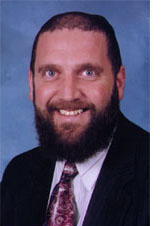By Rabbi Baruch Lederman

SAN DIEGO — Rabbi Eli Rosenholtz told me that Reb Dovid Leibowitz ztz”l, Rosh U’meyaseid Yeshivas Chofetz Chaim (RSA), used to cite the Talmudic dictum, that one should learn not only from the teachings of his rebbe, but from his actions.
Reb Dovid would then exhort his talmidim (students): It looks like this speaking to the talmidim, telling them to observe and learn from every facet of their Rebbe; but it is also speaking to the Rebbe, it is saying that we must strive to be the type of Rebbe that our talmidim can learn from all our actions.
Rav Shlomo Heiman ztz”l was a Rebbe in New York. One day there was a blizzard, so when he arrived to give his shuir (lecture), his normally crowded shiur had only four boys. As was his custom he gave a dynamic, booming, dramatic discourse. He was as animated as if he were giving the shiur to a huge
assembly. One of the boys asked him why he gave such a powerful presentation when there were only four boys present. He answered, “Do you think I was giving the shiur only to you? I was giving it for you and all your talmidim and talmidim of your talmidim. I was giving it for the generations to come. I had to give my all.”
The following story from the Talmud (Brachos 11a) illustrates both of the above principles. Rebbi Yishmael and Rebbi Elazar ben Azariah were lodging at an inn. While they were dining, Reb Yishmael was reclining and Rab Elazar was standing up. When it came time to say the krias Shema, Rebbi Elazar reclined.
Suddenly, Rebbi Yishmael rose upright and stood to recite the Shema. Rebbi Elazar asked him why he suddenly stood up. It puzzled Rebbi Elazar that as soon as he reclined, Rebbi Yishmael rose up. What’s more, the halacha is that you are allowed to say Shema lying or standing. Why did Rebbi Yishmael see a need to stand up?
Rebbi Elazar commented, “My brother Yishmael, your conduct reminds me of a person who receives compliments on his beard and responds by shaving it off.”
Rebbi Yishmael replied as follows: “We all know that there is a dispute between the sages of Bais Shammai and the sages of Bais Hillel regarding the recitation of Shema. Bais Shammai says that uvshacbcha uvkumecha (in your reclining and in you arising) means to say the morning Shema upright and the evening Shema reclining. Bais Hilled holds that uvshacbcha uvkumecha is not telling us what position we need to be in, it simply means to describe the times we say Shema: uvshacbcha means evening (when you recline) and uvkumecha means morning (when you arise). But the Shema can be recited in either position.
Since both you and I were reclining during our recitation of Shema, I was afraid that the talmidim might observe us and assume that we ruled like Bais Shammai, which would be an error as we do not poskin (rule) this way. I arose so that they would see us each in a different position and realize that the halacha is in accordance with Bais Hillel that you may recite Shema in whichever position you choose.”
Rebbi Yishmael was ever aware that his students would be learning and making conclusions from his actions. He realized that his actions, though perfectly valid, could cause confusion amongst the students, for the students are always watching, observing and absorbing. He also realized that the students would go on to teach others. A momentary confusion could turn into an error in Jewish Law that could last for generations.
We all are teachers in one way or another, whether as a Rabbi with talmidim, a parent with children, a faithful active Jew within our community. It means so much for us to realize that our actions have a far reaching, long lasting effect on others. We can strive to be the type of person whose actions and whose very essence provides illumination and inspiration to others.
Dedicated by Simcha Gleich, l’zecher nishmas Yehudis bas Elchonon.
*
Rabbi Lederman is spiritual leader of Congregation Kehillas Torah in San Diego. He may be contacted at baruch.lederman@sdjewishworld.com